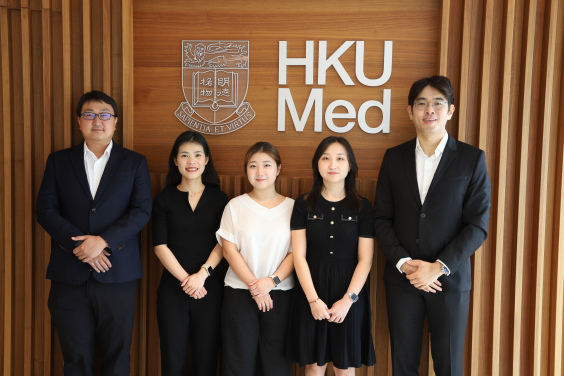Media
HKUMed Public Health researchers investigate the Impact of Replacing Sedentary Time with Physical Activity on Genetic Risk of Coronary Heart Disease
23 Oct 2023
A research team led by Dr Youngwon Kim, Assistant Professor of Kinesiology from the School of Public Health at the Li Ka Shing Faculty of Medicine of the University of Hong Kong (HKU), in collaboration with the MRC Epidemiology Unit at the University of Cambridge School of Clinical Medicine, has conducted a large-scale epidemiological study to examine the potential health benefits of substituting sedentary time (e.g., sitting) for physically active time in preventing coronary heart disease across different genetic risk levels.
The study found that replacing sedentary time, such as sitting, with an equivalent amount of physically active time is associated with a lower risk of coronary heart disease, regardless of one's genetic predisposition to the condition. In particular, individuals with a higher genetic risk of coronary heart disease may experience a more significant reduction in their absolute risk of developing the disease compared to those with a lower genetic risk when substituting physical activity for sedentary time. These findings have been published in the Journal of Internal Medicine. [link to the publication]
Background
The World Health Organization (WHO) Guidelines underscore the importance of minimising sedentary behaviour for achieving optimal cardiovascular health. While excess sedentary time is recognised as a modifiable risk factor, it remains unclear whether replacing sedentary time with an equivalent amount of physical activity time is associated with lower risk of coronary heart disease across varying levels of genetic risk of coronary heart disease.
Research findings
This research utilised extensive genotype and phenotype data including wrist-worn wearable device data from the UK Biobank study which is an ongoing prospective UK cohort of over 500,000 adults. The current analysis included 77,500 white British participants (57% female) without prevalent cardiovascular events and with valid wrist-worn accelerometry data. Each individual’s genetic risk of coronary heart disease was assessed using polygenic risk scores based on 300 genetic variants. Sedentary time, light-intensity physical activity, and moderate-to-vigorous physical activity were quantified using wrist-worn wearable device data.
Three primary findings include:
- Greater wearable-device-measured sedentary time is associated with an increased risk of coronary heart disease, regardless of genetic risk of coronary heart disease.
- Replacing 60 minutes/day of sedentary time with an equivalent amount of moderate-to-vigorous physical activity is associated with about 9% lower relative risk of coronary heart disease. Notably, even replacing as little as 1 minute/day of sedentary time with the same 1 minute/day of moderate-to-vigorous physical activity is associated with a <1% lower relative risk of coronary heart disease, across all levels of genetic risk.
- Replacing sedentary time with the same amount of moderate-to-vigorous physical activity may confer greater reductions in the absolute risk of developing coronary heart disease events in individuals at high genetic risk than in individuals at low genetic risk.
Significance of the study
“Our study provides unique insights into the role that replacing sedentary time (such as sitting time) with an equivalent amount of physical activity time could play in preventing coronary heart disease in individuals of varying levels of genetic risk of coronary heart disease. Our findings corroborate the current WHO recommendations on sedentary behaviour and physical activity, but suggest that, compared with individuals at low genetic risk of coronary heart disease, those at high genetic risk may have greater reductions in absolute risk of developing coronary heart disease by substituting physical activity for sedentary time.” said Dr Youngwon Kim, Assistant Professor, Kinesiology, School of Public Health, HKUMed.
“There are more to reveal on the interaction between genetics and physical activity, and this study sets up a framework through which to further explore it,” added Haeyoon Jang, PhD candidate, School of Public Health, HKUMed.
“Our study illuminates how high-risk populations may achieve amplified risk reduction by replacing prolonged sitting with physical activity. These insights could shape future WHO Physical Activity guidelines, highlighting the power of lifestyle interventions in promoting cardiovascular health.” stated Qiaoxin Shi, PhD candidate, School of Public Health, HKUMed
“To assess the generalizability of the findings to East Asians, it would be worth repeating the study using large East Asian Biobanks,” said Dr Shiu Lun Au Yeung, Assistant Professor, Epidemiology and Biostatistics, School of Public Health, HKUMed.
“Leveraging human genetics can enhance our understanding of the intricate interplay between gene and environment interactions in health outcomes,” said Dr Shan Luo, Research Assistant Professor, Epidemiology and Biostatistics, School of Public Health, HKUMed.
About the research team
The study was led by Dr Youngwon Kim, Assistant Professor, Kinesiology, School of Public Health, HKUMed. Members of the research team included PhD candidates Haeyoon Jang, Mengyao Wang and Qiaoxin Shi, and Dr Shiu Lun Au Yeung, Assistant Professor and Dr Shan Luo, Research Assistant Professor, Epidemiology and Biostatistics.
Other members also included Professor Simon Griffin, Professor Nicholas J. Wareham, Dr Katrien Wijndaele and Dr Soren Brage, MRC Epidemiology Unit, School of Clinical Medicine, University of Cambridge
About the School of Public Health, HKUMed
The School of Public Health (the School), LKS Faculty of Medicine of the University of Hong Kong has a long and distinguished history in public health education and high-impact research. With world-leading research in infectious diseases as well as on non-communicable diseases of both local and global importance, the School has made significant contributions through its research and advocacy to improve the health of populations and individuals, both locally and globally. The School is a leading research and teaching hub in public health on influenza and other emerging viruses, control of non-communicable and infectious diseases, tobacco control, air pollution, psycho-oncology, behavioural sciences, exercise science, life-course epidemiology, population mental health, health economics, health services planning and management. This work has informed international (e.g. the U.S. Food and Drug Administration, Health Canada, the World Health Organization), national and local public health policies.
Media Enquiries:
School of Public Health, HKUMed
Dr Youngwon Kim (Tel: 2831 5252 | Email: youngwon.kim@hku.hk)


